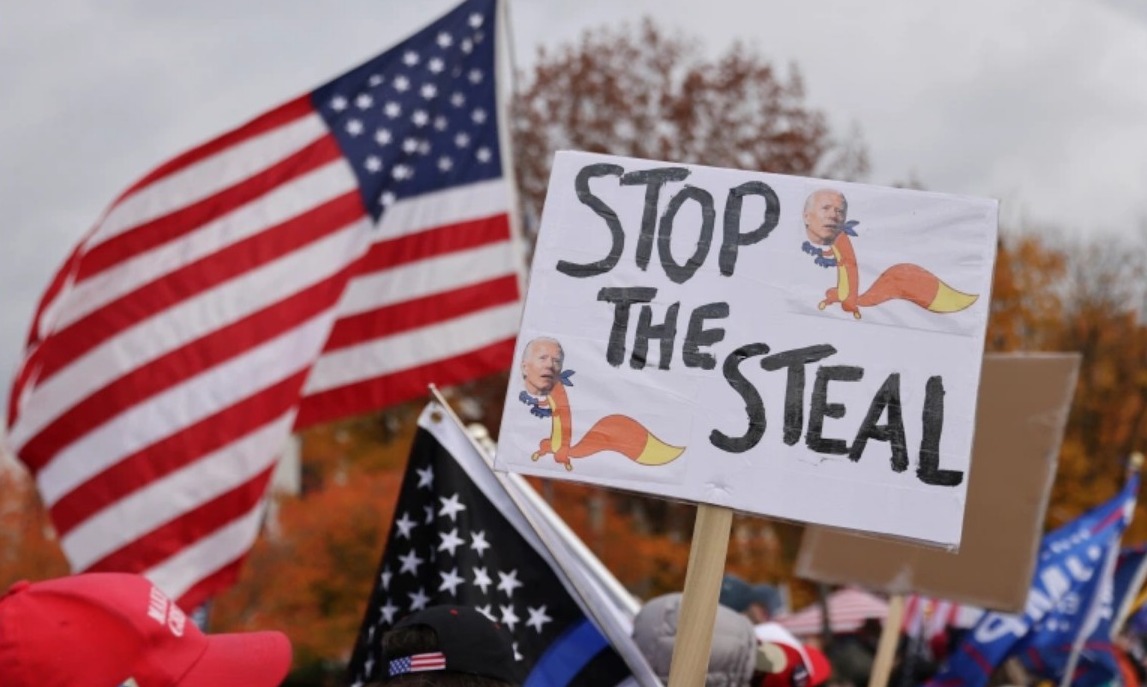GOP electors in 7 swing states just gave President Trump a wide open door to a win via the 12th Amendment.
Monday was a big day with respect to the elections. It was the day that Electors from each state had to send their certified results to the archivist.
There’s a bit of a problem, there. In several states, there are decisions still pending before the court.
Even if the court rules in Trump’s favor after the deadline for certification, if Republicans haven’t already submitted their vote for Trump, too bad. There is no recourse to right the wrong. That ship will have already sailed, so to speak.
So is Trump screwed, just because the process is being actively slow-walked by some partisans who approve of the Biden result?
Not exactly.
Republican electors in four states said on Dec. 14 that they would cast their procedural votes for President Donald Trump and Vice President Mike Pence, the latest update contesting the results of the 2020 election.
Republican electors in Pennsylvania, Georgia, Nevada, Arizona all said they voted for Trump. It comes as their states formally appointed Democratic electors who voted for Democrat Joe Biden and Sen. Kamala Harris (D-Calif.).
The Pennsylvania GOP said in a news release that electors met in Harrisburg to “cast a conditional vote” for Trump and Pence “at the request of the Trump campaign.” Their vote comes as Democratic electors voted in the Pennsylvania Electoral College for Biden and Harris (D-Calif.).
The Pennsylvania GOP cited the 1960 presidential election between Richard Nixon and John F. Kennedy, who would become the eventual winner. “We took this procedural vote to preserve any legal claims that may be preserved going forward,” said Pennsylvania Trump campaign chairman Bernie Comfort in a news release.
In Georgia, David Shafer, the chairman of the Georgia Republican Party, said that electors made their move today because the “President’s lawsuit contesting the Georgia election is still pending.”
“The Republican nominees for Presidential Elector met today at noon at the State Capitol today and cast their votes for President and Vice President,” Shafer said in a Twitter post. “Had we not meet today and cast our votes, the President’s pending election contest would have been effectively mooted. Our action today preserves his rights under Georgia law.”
The Gateway Pundit added:
The Electoral Count Act (ECA) of 1887 says each chamber of Congress will separately decide which slate of ‘dueling electors’ to accept.
The new congress that will be sworn in on January 3 will be the ones doing the count.
The Senate would vote for the Vice President. Republicans currently hold the Senate.
The House of Representatives would choose the President however it is not one vote per lawmaker like it is in the senate.
The House in each state gets one vote and with the new Congress, Republicans will have the advantage with 27 of the state delegations – a candidate needs 26 votes to win the White House.
If the two chambers disagree, we could end up in uncharted territory, though experts typically say that electors approved by each state’s “executive” should prevail.
And QZ.com confirms how the 12th Amendment works:
States allow the popular vote to determine the appointment of electors, but Trump and his allies could use friendly state legislatures and governors to send alternate—or in the case of states with Republican legislatures and Democratic governors, additional—electors. When the electoral college convenes on Dec. 14, states with competing electors would cast double their allotted votes, forcing Senate president Mike Pence to figure out what to do with the doubled-up votes. If Pence threw out the extra votes and neither candidate hit 270, the decision goes to the House. There, each state delegation gets one vote; currently, in 27 states, a majority of delegates are Republican.
(For a trip down memory lane: Back in 2000, Florida’s Republican legislature was on the cusp of appointing new electors to vote for Bush as the court-ordered recount dragged on. The SCOTUS decision rendered that preparation moot. Also, in 1876, states sent competing electoral college delegations and after Congress failed for months to agree on which was valid, a last-minute deal was struck that made Rutherford B. Hayes president as long as he agreed to end Reconstruction.)
It may be a long shot but it does give hope that President Trump still has a path towards an election victory. This fight is not over yet.


